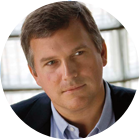
Now those guys, they know how to squeeze customers!
Some delightfully straight talk from Dell's software chief, John Swainson, in an interview with IDG . He's talking about their challenges rationalizing all the (largely IT admin) products they've acquired, notably through their buyout of Quest Software. That specific field is a little out of our wheelhouse here [at xTuple], but the general observations he makes are dead-on for ERP Graveyard readers:
IDG News Service: Having that many products is a blessing and a curse. Have you done much paring back? You have a few different data protection products, a few virtualization platforms. Swainson: We had four data protection products, several virtualization, a bunch of performance management. The first time we did the count we decided we had something like 200 products in Quest alone, and after we went through in gruesome detail and eliminated the obvious overlaps. We've got about 40 or 50 products.
IDG News Service: That's a big paring back.
Swainson: A lot of this was features that were masquerading as products. So things that should never have been products, like utilities, we'd merge back into the performance management product and have a suite instead of trying to sell it separately. Some of it was straight overlap. In storage management, we really did have four data protection products, so now we're going through the technical process of taking the best of each product and putting it together, on a common framework. That's the long hard way to do it but sometimes it's worth it because there's a $200 million revenue stream and it's worth protecting.
IDG News Service: Which one wins, the one with the most customers?
Swainson: The one that's the best architected and the most flexible and modern and that has the most features usually wins, because it's the one you can take back to that customer set and make it the upgrade. And you can usually modify it enough so that the upgrade is seamless.
IDG News Service: So then you end-of-life those products?
Swainson: Only maybe five of them have been literally end-of-lifed. You converge them, you sell them as packages. They're not discrete products any more, that's the big difference. The reason you don't want to [end of life them] is because in the software industry, all the profitability comes from the tail. You're better off putting it on maintenance. Even though it'll attrition away over time, it'll still be profitable. Exhibit A on this are people like Oracle.
I do think he meant it as a compliment. Also of note, he mentioned earlier in the article that Dell hadn't quite figured out what to do in the area of hosted business applications: "The challenge is that it's a different customer, it's a different selling cycle, it's quite heavily fragmented, and the only real way to make money out of it I think is to own your own IP [intellectual property], and the IP is very expensive."
He's probably right about that last point. Remember the Application Service Providers of the '90s?
So if you're a company looking for a next-generation business solution, but want to retain control over your software investment, what are your options? SaaS and The Cloud are only partial solutions; without the ability to pack up and move your private cloud anywhere else you want (try doing that with NetSuite), you've just traded one form of vendor lock-in for another.
Here's a hint: Look into open source ERP. Not only do you have access to the full source code, you can host your application wherever you want — and have full portability, from one cloud to another, or even back to onsite if that's what you decide.
